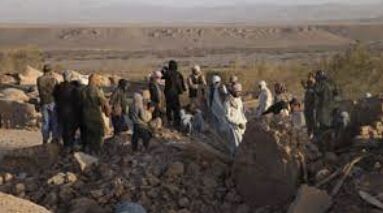Devastating Earthquake in Afghanistan Leaves Thousands Dead and Communities in Ruin, Urgent Aid Needed
A devastating earthquake in western Afghanistan has claimed at least 2,000 lives, with fears of a rising death toll. Rescue efforts are underway, but the country's struggling healthcare system and decreased international aid pose challenges. The international community is urged to provide urgent assistance.
In one of the deadliest earthquakes to hit Afghanistan in two decades, at least 2,000 people have been killed in western Afghanistan, according to a Taliban government spokesperson. The earthquake, with a magnitude of 6.3 followed by strong aftershocks, struck near the city of Herat. The death toll is expected to rise, as rescue efforts are currently underway to dig people out of the rubble. Abdul Wahid Rayan, spokesperson at the Ministry of Information and Culture, reported that six villages have been destroyed and hundreds of civilians are feared buried under debris.
The United States Geological Survey stated that the epicenter of the quake was about 40 kilometers northwest of Herat, with several strong aftershocks following the initial tremor. Canada and other international organizations have expressed their readiness to support the Afghan people affected by the earthquake. However, the situation is exacerbated by Afghanistan's struggling healthcare system, which relies heavily on foreign aid that has been severely cut since the Taliban took control of the country. Concerns over Taliban restrictions on women and competing global humanitarian crises have led to a decrease in financial support from donors.
Efforts to rescue and assist survivors are ongoing, with the World Health Organization dispatching ambulances to evacuate casualties and assist in the treatment of the injured. The Afghanistan Red Crescent Society and other aid groups have also mobilized rescue teams and set up temporary camps for displaced individuals. Additionally, neighboring countries such as Pakistan and China have pledged their support and assistance. As the extent of the damage becomes more apparent, the international community is urged to provide urgent financial aid to address the immediate needs of the affected population.
The scale of the tragedy is immense, with villages flattened and people trapped under collapsed buildings. The situation is worsened by the scarcity of resources, particularly food, in the region even before the earthquake struck. While exact figures and details remain difficult to ascertain due to unstable communication networks, the priority now is to provide immediate relief and medical assistance to the affected areas. The resilience of the Afghan people and the support of the international community will be crucial in the long-term recovery and rebuilding efforts.




